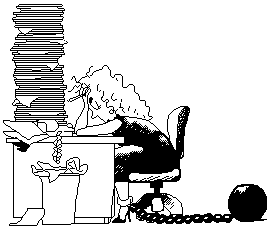File last modified:
|
|

I like to teach classes in the afternoon, since I know how late college students go to bed, and I don't go to bed a whole lot earlier myself. Still, let me preach a little sermon here on (1) sleep and (2) stress.
1. On the sleep front: Only "morning people" think that it matters exactly which hours you sleep. As a non-morning person, I am quite sure it doesn't. But actual shortage of sleep has been blamed for everything from zits to stupidity, and much of the evidence is convincing.
Research by Amy R. Wolson, of the department of Psychology at the College of the Holy Cross, in Worcester, Massachusetts, documented the relation between sleep habits and grades among students. In a 1997 study of 3,120 high school students, she and her collaborators divided the cases into a group that regularly slept more than eight hours and fifteen minutes a night and a group that regularly slept less than six hours and forty-five minutes. Weekday and weekend sleeping patterns were separately considered. Students who slept less, and students who had greater differences between weekday and weekend sleep, reported being more depressed and sleepier in the daytime, but also tended to have lower grades (C, D, and F).
Shortage of sleep has been blamed for everything from zits to stupidity, and much of the evidence is convincing.
Subsequent studies have repeatedly found the same thing. Jodi Mindell, a researcher at St. Joseph's University in Philadelphia, concluded in 2007 that people between the ages of 13 and 18 required a minimum of eight and a half to nine and a half hours a night for normal functioning. (That is less than older people require, which is probably part of why older people think of teenagers as lazy.)
Other research is showing that long-term sleep deprivation, over a period of years (or decades), can lead to more or less permanent impairment in mental functioning.
Naps: It is not unusual for a college student (or pretty much anybody else) to find that a brief nap can be remarkably refreshing. A twenty-minute cat-nap before or after (but not during!) class may turn out to be one of the best things you have ever done to your activity schedule. Don't go much past twenty minutes, though, or the result, anecdotal evidence suggests, is just sluggishness.
2. On the stress front: In August of 1998, investigators at UCI reported experiments showing that memory in rats is seriously impaired by stress. A stressed-out rat (one with elevated levels of corticosterone secreted in response to an electric shock) is far more likely to get lost in a familiar maze than a mellow one is.
It is not yet clear whether there is a simple relation between stress and memory loss in humans, but that is the expectation. (Rat corticosterone is similar to cortisol, secreted by human adrenal glands in response to danger.) James L. McGaugh, director of the UCI Center for Neurobiology of Learning and Memory provisionally advised that students should relax before taking tests or doing other things involving memory. (This supposes that exams for students are like mazes for rats. Or like electric shocks. Or both. I'll buy that. It also supposes that it is possible to relax before a test. That seems a lot less likely.)
Obvious conclusions: For students, the best advice is probably to convince yourself that your classes are consistently interesting, cool, enjoyable, and so on, and to try to feel as distant as possible from the whole issue of grades and grading. (Grades happen whether you fret about them or not, so you can in fact ignore them more easily than you think. It is the class that demands attention, not the grade.)
If you approach classes as right up there with cleaning out the chicken coop, you will end up with lower grades.
If you can persuade yourself that a class is really interesting, then sleep, stress, and ultimately also grades and the learning that grades are supposed demonstrate, all will tend to take care of themselves. On the other hand, if you approach classes as right up there with cleaning out the chicken coop, you will like college less, learn less, and (if you still care) end up with lower grades. So, um, draw your own conclusions!
So why are you sitting up reading this? Go to bed already!